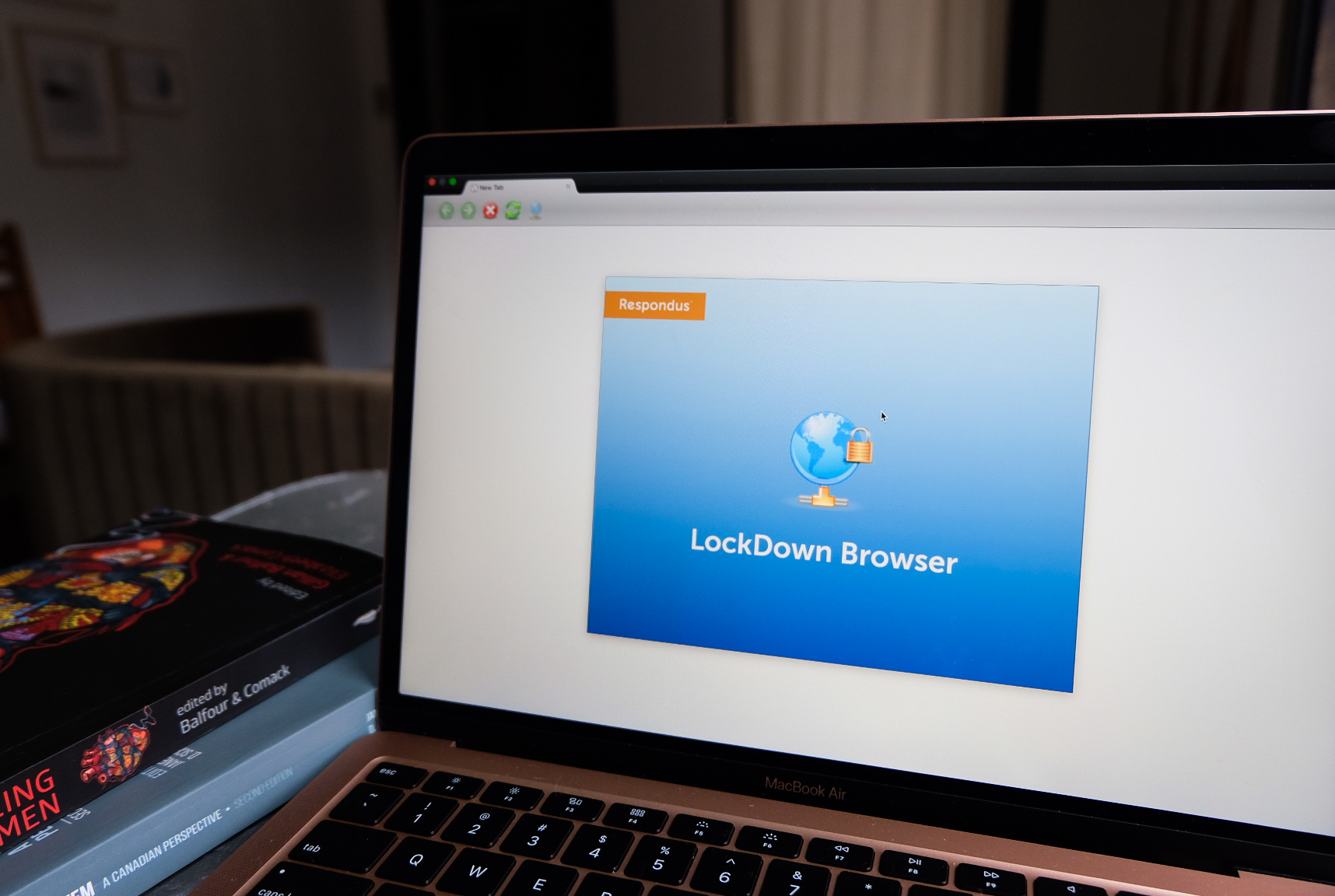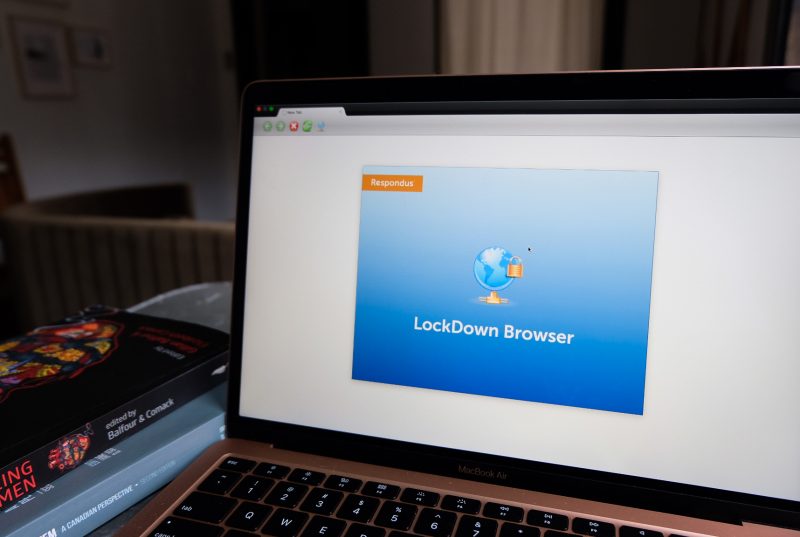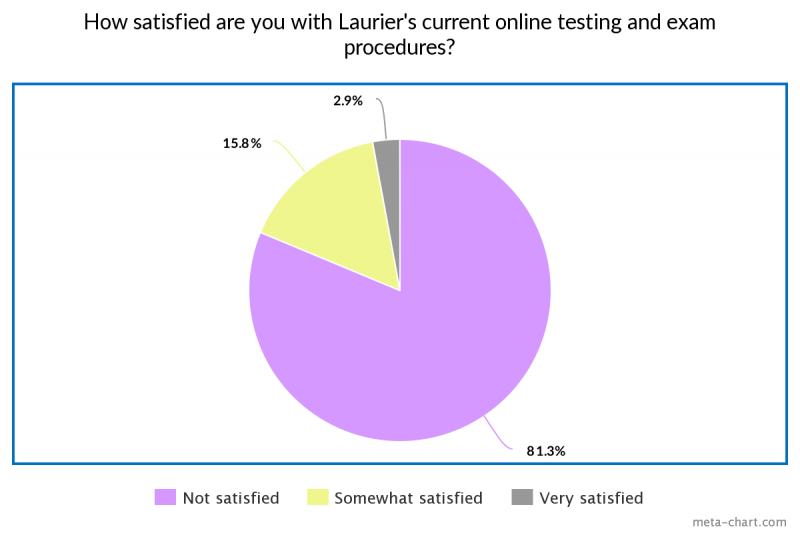Students voice frustration with Laurier’s online midterm exam policies

Wilfrid Laurier University joined countless Canadian post-secondary institutions in the fall when the majority of courses for the semester were adapted to online formats to prevent furthering the spread of COVID-19.

Wilfrid Laurier University joined countless Canadian post-secondary institutions in the fall when the majority of courses for the semester were adapted to online formats to prevent furthering the spread of COVID-19.
The transition into virtual learning also introduced the implementation of increased online test monitoring, requiring many students to use Respondus Lockdown Browser + Monitor (RLDB + Monitor). The program is designed to prevent academic misconduct, and currently holds a 1.3 star rating out of five on the App Store.
The decision to use this exam software is determined by individual instructors, according to the Laurier FAQ about online proctored exams. Basic requirements for taking these exams include recording the student’s image and voice for the duration of the examination, a secure wifi connection and a 360-degree environmental scan of the space the test is being conducted in.
Backlash over webcam stipulations, specifically for a Laurier math course, occurred during the spring semester. Students were initially told in an email that they would be expected to purchase an external webcam in order to complete the exam.
“… you are required to have an external, stand-alone webcam (with a minimum resolution of 720p) for your online final examination in all Math/Stat courses. Built-in/integrated webcams are not accepted, and there are no alternatives to writing exams in this manner,” the email stated.
The requirement was eventually reversed as a result of an influx of complaints.
Laurier has since received heightened criticism from students regarding detailed exam requirements and have continued to voice their displeasure on social media.
Online proctored testing flags certain behaviour, movement and noise. Students are instructed to complete exams at a desk or table. They are also instructed to not look away from their screen, fidget, speak out loud, leave the test at any time or skip a question and go back to it later.
In some cases they are even required to “hold a mirror in front of your webcam” so that it can record “what is on and around your computer.”
Prohibited testing space instructions have listed things such as not allowing other people in the same home to use the internet while completing an exam and not sitting with any photos that include human or animal faces in the background.
Improper environment scans can result in test failure, while performing any of the previously listed actions can cause a student to be flagged for cheating or receive a zero on the exam in question.
Students have brought forward their concerns, such as technical issues, regarding the Lockdown Browser program.
“Lockdown Browser was not working on my computer and I contacted the school for help. They had me check my wifi and it was found that was not the issue. However, instead of providing assistance on how to solve this problem or give me another contact for help. They just told me to use a different computer, which is impossible for me to do as I do not live at home and am not in a financial situation to purchase a new computer just for lockdown browser,” a current Laurier student said in an email statement to The Cord.
Students have shared midterm outlines they’ve received in classes, with one example of a professor who required students to complete 50 questions in 25 minutes, stating that, “Without tight controls over academic integrity, unfortunately, the value of the degree is eroded.”
There have also been claims that there is a “massive disproportion of flagged events against people of colour.” The post alleged that people of colour get flagged more because “facial recognition AI has been notoriously trained on and used by white people.”
Laurier professors, alumni and faculty have also expressed their concerns.
“Prof here: I’ve taught at Laurier for many years, and have never seen students so overwhelmed & stressed. I feel for all of you who are really being put through so much right now, whether it’s lockdown browser, or just overall pandemic stress. Hang in there, golden hawks,” a tweet posted on Spotted at Laurier said.
Laurier responded to The Cord’s request for comment by citing the statement made by the university on Oct. 28.
“As we move through mid-term tests/exams, we have heard loud and clear from students who are frustrated by the detailed requirements they’re being asked to follow to write tests/exams remotely in some courses. We want you to know that we hear you,” Ivan Joseph, Laurier’s vice president: student affairs and Anthony Vannelli, provost and vice-president: academic, said in the statement.
“First, we will be working with faculties and instructors to collaborate in developing solutions to concerns about test/exam requirements that have been raised with us to date. We will be providing options and additional support that will help address the concerns raised by students.”
Along with wanting to hear concerns from students directly by emailing studentfeedback@wlu.ca, Laurier will also be “investing in additional resources across the university to support instructors to continue to adapt their courses and to enhance our ability to respond to student concerns.”
A letter from Students’ Union president and CEO Devyn Kelly that was addressed to undergraduate students was also posted on Oct. 28.
“While our advocacy initiatives are not always apparent to the general student body, we have been diligently emphasizing the importance of constructive assessment strategies with the University since this issue emerged in the Spring,” Kelly said.
“We have continued to advocate for an environment that prioritizes innovative remote teaching strategies. The solution to these challenges is not a focus on surveillance and policing, but rather by fostering a community of trust between students and educators.”
“The position of the Students’ Union has remained the same since our original stance about external webcams in May. We recognize the equity, security, and privacy concerns that many students have experienced with the online proctoring software Lockdown Browser. We have been very clear in our position that faculty should be exploring and implementing alternative assessment methods rather than defaulting to Lockdown Browser.,” she said in the letter.
In a follow-up letter published on Oct. 29, Kelly said, “The Students’ Union will be meeting regularly with this group to communicate our continued objection to many of these unreasonable requirements and the use of Respondus Lockdown remote proctoring.”
“We will ask that the University develop an official channel for students to register their concerns and reintroduce course evaluations.”
“The challenge we are facing is that faculty do have the academic freedom to design midterms and exams as they see fit. However, we believe that many of the instructions and restrictions communicated since the imposition of remote learning create inequities and are overly punitive,” she said.
The Cord conducted a survey concerning student satisfaction with Laurier’s online exam protocols. The identity of the 139 respondents will remain anonymous.
81.3 per cent of participants said that they were “not satisfied” with Laurier’s online testing procedures, while 15.8 per cent stated that they were “somewhat satisfied.”

71.2 per cent said that they prefer in-person exams and 80.6 per cent of people noted that they have experienced technical difficulties while using LockDown Browser or other online learning software.
In response to the question about how online testing and schoolwork has affected their mental health, 90.6 per cent answered “negatively,” while 7.2 per cent chose “positively” and the remaining 2.2 per cent selected “no impact.”
When asked to provide comments about changing Laurier’s online exam system if participants felt the need to do so, many of the responses focused on a perceived invasion of privacy and feelings of elevated anxiety surrounding the extensive requirements some classes are expecting students to abide by:
“Yes, a lockdown browser system is good, but accessing our webcams in our own rooms is an invasion of privacy, especially when asked to show the entire room and drawers, also students should be able to go back pages on exams as they would be able to during a regular exam.”
“There has to be a change for the sake of student’s mental health and capacity to do well which means more integrative approaches to allow for in person testing and less online material.”
“Reduce the restrictions set. We are not out to cheat but all of these restrictions are making me feel even more nervous to take [an] exam resulting in a lack of concentration and high performance. When we used to have in person exams I used to read the question quietly to myself and I would fidget and look around the walls when I’m thinking. I am not able to do this now because it would be called cheating.”
Calls for open-book testing, less restrictive guidelines and removing invasive monitoring were among the most popular answers and requests.
A petition has been started to “Remove the need of webcams during online examinations at Laurier” and currently has over 2,000 signatures.
The University of Waterloo released an informational guideline for professors to turn to surrounding academic integrity, which lists things such as “don’t assume that all, or even most, students, will cheat” and “avoid situations where students are more likely to feel desperate.”
UW has been used as an example by Laurier students as having more ‘compassionate’ online testing and learning procedures, as well as other Canadian universities who have implemented relaxed exam regulations in light of the stresses brought on by the pandemic.
“It’s ridiculous that a small university that prides itself on student satisfaction is using exam surveillance tools, what kind of a democratic school is that? Smells more like a fascist institute more than anything. I am disgusted,” one survey respondent said.
On Oct. 8, the 2021 Maclean’s Magazine university rankings were released. Laurier dropped to number five in comprehensive student satisfaction after holding the number one spot for four years in a row in 2019.
Twitter users have also referenced Laurier’s handling of online exam procedures and student concerns as possible reasons for the lowered ranking.
More information to come.


